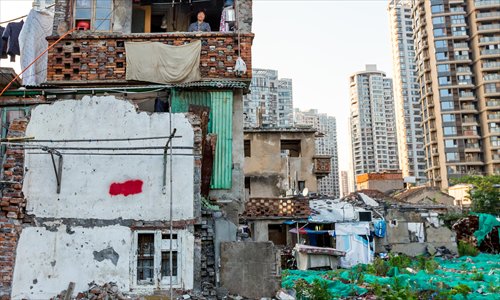Three murders highlight the ongoing tension over govt forced relocation

Pictured are damaged houses and garbage in the Guangfuli residential community, one of the most expensive communities in Shanghai. Demolition work in Guangfuli came to a stop after residents refused to leave because they and the local government had disagreements over property rights and compensation. Photo: IC
A villager in Central China's Henan Province who allegedly refused to allow his home to be knocked down was fatally shot by police after he killed a government official and two workers, triggering public discontent over the controversial issue of forced demolitions.
Fan Huapei, 36, from Xuegang village in Zhengzhou was killed Tuesday after he slaughtered a deputy director of a street administrative office in Huiji district, two demolition workers and injured another worker. Fan's family told The Beijing News on Thursday that Fan resorted to force after pressure was put on him to have his new house demolished.
Zhengzhou police released a statement on their official Sina Weibo account on Tuesday, saying that they received a report from Xuegang residents at around 5 pm. After police arrived at the scene, the suspect shouted and drove his car into another vehicle. Police officers say they fired a warning shot but when Fan failed to stop his car, they then killed him. The police did not specifically explain what drove Fan to murder.
However, Fan was later dubbed a "hero" among the locals who held a grand funeral for him and made donations to his family, reports said.
Demolished trust
According to The Beijing News, hundreds of locals came to Fan's funeral on Wednesday and nearly 150 villagers, as well as large numbers of unidentified people, have donated money to his family.
Fan's family said that his fury might have been sparked by the unreasonable compensation offered to him by the Huiji authorities. Fan's family said that local residents began to move in April and over 95 percent of Xuegang's 456 villagers have now been relocated and most of their houses are demolished.
However, Fan was one of the few who refused to sign the contract and move. Fan's uncle said that a year ago, he spent 700,000 yuan ($107,240) on a seven-story house and planned to rent it out. However, the local government only offered him 500,000 yuan in compensation for his home, which would not be enough for him to pay off his debts.
According to the report, households that agreed to move were promised 7,200 yuan annually for each person over the next three years on top of their lump sum with an additional 5,000 yuan annually for living expenses. However, the government did not give them new homes.
Many locals have expressed concerns over whether they will really get all that money if they agree to move.
The Ministry of Land and Resources issued a notice in 2010, which requires local governments to arrange new homes for residents first and then demolish their houses, firmly banning forced demolition.
Zhengzhou officials in charge of the demolition refused to make any comment.
'I cannot live anymore'
According to the Beijing-based Legal Mirror, Fan found out that his electricity and water had been cut on the day of the killing spree. He saw a truck driver conducting repairs near his home and thought that he was the one cutting off his power. He stabbed the driver and then went to the street administrative center and killed Chen Shan, 42, its deputy director.
When he drove back home, he also stabbed two air conditioner recyclers, who were father and son. Fan thought they had come to his house to take his air conditioners and killed the pair after they argued. Fan reportedly posted a message on his WeChat account at 5 pm on that day, saying that "I killed people and did not save [them]. I cannot live anymore."
The Beijing News released a commentary on Friday, describing Fan as a murderer, arguing his crime is unforgivable, and that he is not a hero.
However, Hu Xingdou, professor at the Beijing Institute of Technology and expert on China's social problems, told the Global Times that Fan's reaction reflects locals' dissatisfaction with forced demolition.
"For a long time, China lacked effective supervision of forced demolition. People whose properties were demolished had to fight back violently and their acts have been regarded as heroic," said Hu, adding that this case shows that such conflicts are deep-rooted and the government should work harder to solve the problem of forced demolition.
This is not the first time people have been hurt by the Huiji government's demolition projects. Locals told caixin.com that in past they launched demolition projects without negotiating with residents. On the day the project begins, they simply send demolition teams to begin their work.
In January, No.4 Hospital of Zhengzhou University began to be demolished without receiving any notice. Six bodies in the morgue were buried under rubble, nearly 20 million yuan of damage was done to equipment and several staff members were injured, according to the Xinhua News Agency.
Newspaper headline: Demolition man